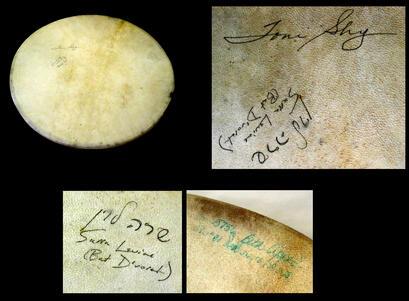Nina Beth Cardin
This tambourine was used in the early 1990s in a cross-denominational celebration of the ordination of women.
In the early years of women entering the rabbinate, many women felt we were welcomed to rabbinical school on the expectation that we would act like men. We often felt that no accommodation was made to explore how women would be different than men as rabbis.
At that time, women rabbis and rabbinical students, under the auspices of the New York UJA/Federation Women's Task Force, began to gather for study to explore issues pertinent to women in the rabbinate. Those involved determined that our ordination ceremonies, as meaningful as they may have been for our denominational interests, did not sufficiently recognize or appreciate the significance of our gender.
So for one or two years (it was very short-lived), we held a women's ordination ceremony – not to confer ordination, but to celebrate it with our women colleagues from all of the liberal seminaries.
This “ordination” ceremony, full of women's study, women's prayers, and women's symbols, was a counterpart to the classic ceremony replete with male symbols. Our goal was to say that here, at least, there is an appreciation for the gendered nuances that would likely appear in our rabbinates.
We learned together, taught by a new rabbi from each seminary. We sang and were led in a recitation of a special kaddish d'rabbanan by Rabbi Karen Reiss.
The tambourine was displayed throughout the evening. The women present signed it – capturing for history the names of those newly ordained, and transcending denominational distinctions. In the hands of a Jewish woman, the tambourine is a symbol of passage, hope, and achievement. The symbolism comes from the story of Miriam and the women of the Exodus, who brought tambourines with them out of Egypt. And when they sang their song of thanksgiving at the Red Sea, they raised their tambourines and danced. For the newly ordained women of this program, this tambourine likewise represented a moment of transition. We passed from the lives of students to the roles of authority and mentor.
This event ceased when the primary players moved on; it needed a few more years of institutional stability to create of itself a tradition. And the ink with which the women signed has faded over the years.
But the tambourine is still safely with me in Baltimore, MD.
Rabbi Nina Beth Cardin is the Director of Jewish Life at the JCC of Greater Baltimore. Ordained at the Jewish Theological Seminary in 1988, Rabbi Cardin then served the Seminary in numerous capacities, including Assistant to the Vice Chancellor, Special Assistant to the Chancellor and Visiting Lecturer in Theology. Rabbi Cardin is also Editor of Sh'ma: a journal of Jewish responsibility. She was the Founding Associate Director of the National Center for Jewish Healing; and Founder of the Jewish Women's Resource Center at the National Council of Jewish Women in New York City. She is the author of several articles and books, including Tears of Sadness, Seeds of Hope: a Jewish spiritual companion to infertility and pregnancy loss, and A Tapestry of Jewish Time: a spiritual guide to the holidays and lifecycles. Rabbi Cardin is one of the founders of SHLEIMUT, a new multi-disciplinary program in the emerging field of Jewish health, healing and wholeness. She lives with her family in Baltimore, Maryland.





Nina Beth Cardin REUSNER was a member of the feminist cabal that maneuvered the vote approving women entering the “reb school” of JTS. Secretaries were put in place to plan the timing of the vote to occur when many members who would vote against it were on vacation and out of town.
But who cares? And what do _I_ know about her? As they say, “Don’t ask”.
BTW, the above from her mouth.